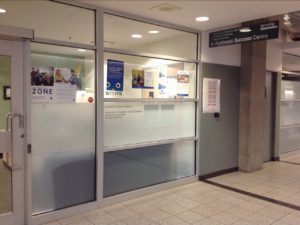It’s a new school year, and for many new and returning students, this might be the first time you’re heading to campus for classes. If you are worried about in-person school or re-entering public life, here are some tips to help you boost your back-to-campus confidence.
Put some distress tolerance skills in your toolbox and practice them so they’re sharp
With over 7,000 years of history behind the practice, the aim of meditative and relaxing techniques is to instill calm and learn to direct one’s attention (though not “emptying one’s mind”). Bonus: NAIT has a chaplain from the oldest of these traditions!
Most are easy to learn, and the more you use them, the better you’ll work. Start with “low stakes” practice—a quiet time of day with as few interruptions as you can manage when you are otherwise in a better mood. Eventually, you’ll be ready to deploy them in a “high stakes” situation—that’s their whole purpose! No one implements these techniques perfectly every time. It’s the intention and ongoing attempt that counts.

Grounding is another option—it’s like meditation on steroids. Instead of eliminating distressing thoughts, grounding abides by them while freeing us up to act in the way we want to. Head to YouTube and search ‘Dropping Anchor’ or ‘Leaves on a Stream’ for good starting exercises.
You can also assign your distress a character from a movie, story or make one up yourself. Is your anxiety the world’s worst house guest? Is it a frenemy? What’s its cringe-worthy name, and how does it dress? Does it have a hobby or job, besides sabotaging what you aimed to do today and wasting all your time?
Make a list of what eeks you out and rank it like a ladder
Everyone will have different reactions to different aspects of returning to campus. Sometimes it’s the detail we least expect! And rarely is the ranking or particular item rational—we just know it freaks us out. Start at the easiest item on your list and contemplate them while grounding until it no longer grips you. Feel free to tackle one, maybe two, new rungs in a session. Start at the bottom every time and notice that it gets easier with each practice. The fancy name for this is “systematic desensitization,” and it’s another of psychology’s most effective tools.
Arrange a campus visit prior to the en-masse return to campus
Remember, our anxious brains need to see things. They are not easily convinced by chatter because the alarm bell of anxiety is so much older than language. Start with imagining the full sequence of a real visit in your mind and intersperse grounding as you notice any tension build. NAIT offers a virtual tour that can help with this. When you are ready to try for real, start gradually with a drive past, walk outside or some bench time near your usual entrance. Arrange to meet a colleague or schoolmate you like or bring someone from your personal network. Anxiety reduction works best if that someone is also at least a bit apprehensive.
If this seems like a tall order, don’t press it. Leaving in a panic won’t help. Instead, seek professional consultation from someone experienced in systematic desensitization.

Plan a treat for yourself for your first day back
Try to incorporate something that you particularly enjoy. Food or drink is great, especially if it’s warm. Make it social! Bring at least one person you trust/like and play a game or icebreaker to divert your attention. You could also try sitting by a fireplace—most buildings at NAIT have one. If you can’t find one, put the virtual fireplace log on your phone and watch for the flannel poker guy or your favourite version.
Give yourself permission to let your nerves show
Anxiety may try to trick you into thinking you have to hide your fear—this is one way it perpetuates itself. Social anxiety, in particular, will try to convince you that seeming anxious is a major turn-off to peers—in reality, especially in today’s circumstances, they’ll admire your bravery or might even confess that they feel similarly.

If all else fails, remember that NAIT has numerous mental health resources you can access. Our team of highly qualified, registered counsellors can help you with anxiety, depression, stress, adjusting to student life, personal or sexual identity and much more. In-person appointments and urgent walk-ins resume on August 22. Our main campus office is HP Centre W111PB. We are open Monday to Friday, 8:30 a.m. to 4 p.m. and limited evening appointments are available by phone.






